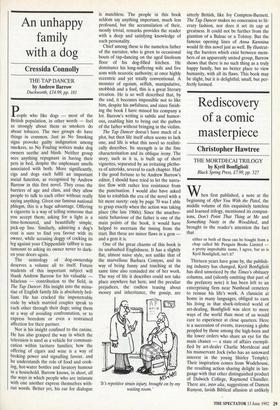An unhappy family with a dog
Cressida Connolly
THE TAP DANCER by Andrew Barrow Duckworth, £14.99, pp. 181 Pople who like dogs — most of the British population, in other words — feel as strongly about them as smokers do about tobacco. The two groups do have things in common. Just as No Smoking signs provoke guilty indignation among smokers, so No Fouling notices make dog owners seethe and blush. Neither group sees anything repugnant in having their pets in bed, despite the unpleasant smells associated with both. More significantly, cigs and dogs each fulfil an important social function, as recognised by Andrew Barrow in this first novel. They cross the barriers of age and class, and they allow people to talk to each other without really saying anything. Given our famous national phlegm, this is a huge advantage. Offering a cigarette is a way of telling someone that you accept them; asking for a light is a time-honoured, and beautifully simple, pick-up line. Similarly, admiring a dog's coat is sure to find you favour with its owner, while accusing doggy of cocking its leg against your Chippendale tallboy is tan- tamount to asking its owner never to dark- en your doors again.
The semiology of dog-ownership deserves a volume all to itself. Future students of this important subject will thank Andrew Barrow for his valuable hilarious — contribution to the field, in The Tap Dancer. His insight into the minu- tiae of English family life is absolutely bril- liant. He has cracked the impenetrable code by which married couples speak to each other through their dogs; using them as a way of avoiding confrontation, or to express boredom or even a restrained affection for their partner.
Nor is his insight confined to the canine. He has also grasped the way in which the television is used as a vehicle for communi- cation within taciturn families; how the offering of cigars and wine is a way of broking power and signalling favour, and he understands the role of food and cook- ing, hot-water bottles and lavatory humour in a household. Barrow knows, in short, all the ways in which people who are intimate with one another express themselves with- out words. Better yet, his ear for dialogue is matchless. The people in this book seldom say anything important, much less profound, but the accumulation of their, mostly trivial, remarks provides the reader with a deep and satisfying knowledge of each personality.
Chief among these is the nameless father of the narrator, who is given to occasional bouts of tap-dancing on the aged linoleum floor of his dog-filled kitchen. He dominates his long-suffering wife and five sons with neurotic authority; at once highly eccentric and yet totally conventional. A monster of egoism, selfish, manipulative, snobbish and a fool, this is a great literary creation. He is so well described that, by the end, it becomes impossible not to like him, despite his awfulness, and since finish- ing the book I have missed his company a lot. Barrow's writing is subtle and humor- ous, enabling him to bring out the pathos of the father without bringing in the violins.
The Tap Dancer doesn't have much of a plot, but then life itself often seems to lack one, and life is what this novel so realisti- cally describes. Its strength is in the fine characterisation and its oblique irony. The story, such as it is, is built up of short vignettes, separated by an irritating pletho- ra of asterisks, several to each chapter. Had I the good fortune to be Andrew Barrow's editor, I should have tried to let the narra- tive flow with rather less resistance from the punctuation. I would also have asked him to establish the era of the novel with a bit more surety: only by page 70 was I able to grasp exactly when the action was taking place (the late 1960s). Since the anachro- nistic behaviour of the father is one of the main points of the book, it would have helped to ascertain the timing from the start. But these are minor flaws in a gem and a gem it is.
One of the great charms of this book is its unabashed Englishness. It has a slightly flat, almost naive style, not unlike that of the marvellous Barbara Comyns, and its way of being funny and touching at the same time also reminded me of her work. The way of life it describes could not take place anywhere but here, and the peculiar prejudices, the endless teasing about money and inheritance, the gossip, are
'It's repetitive strain injury, brought on by my waiting room.' utterly British, like Ivy Compton-Burnett. The Tap Dancer makes no concession to lit- erary fashion, nor does it set its cap at greatness. It could not be further from the giantism of a Balzac or a Tolstoy. But the famous opening lines of Anna Karenina would fit this novel just as well. By illustrat- ing the barriers which exist between mem- bers of an apparently united group, Barrow shows that there is no such thing as a truly happy family, but no better place to view humanity, with all its flaws. This book may be slight, but it is delightful; small, but per- fectly formed.


















































 Previous page
Previous page